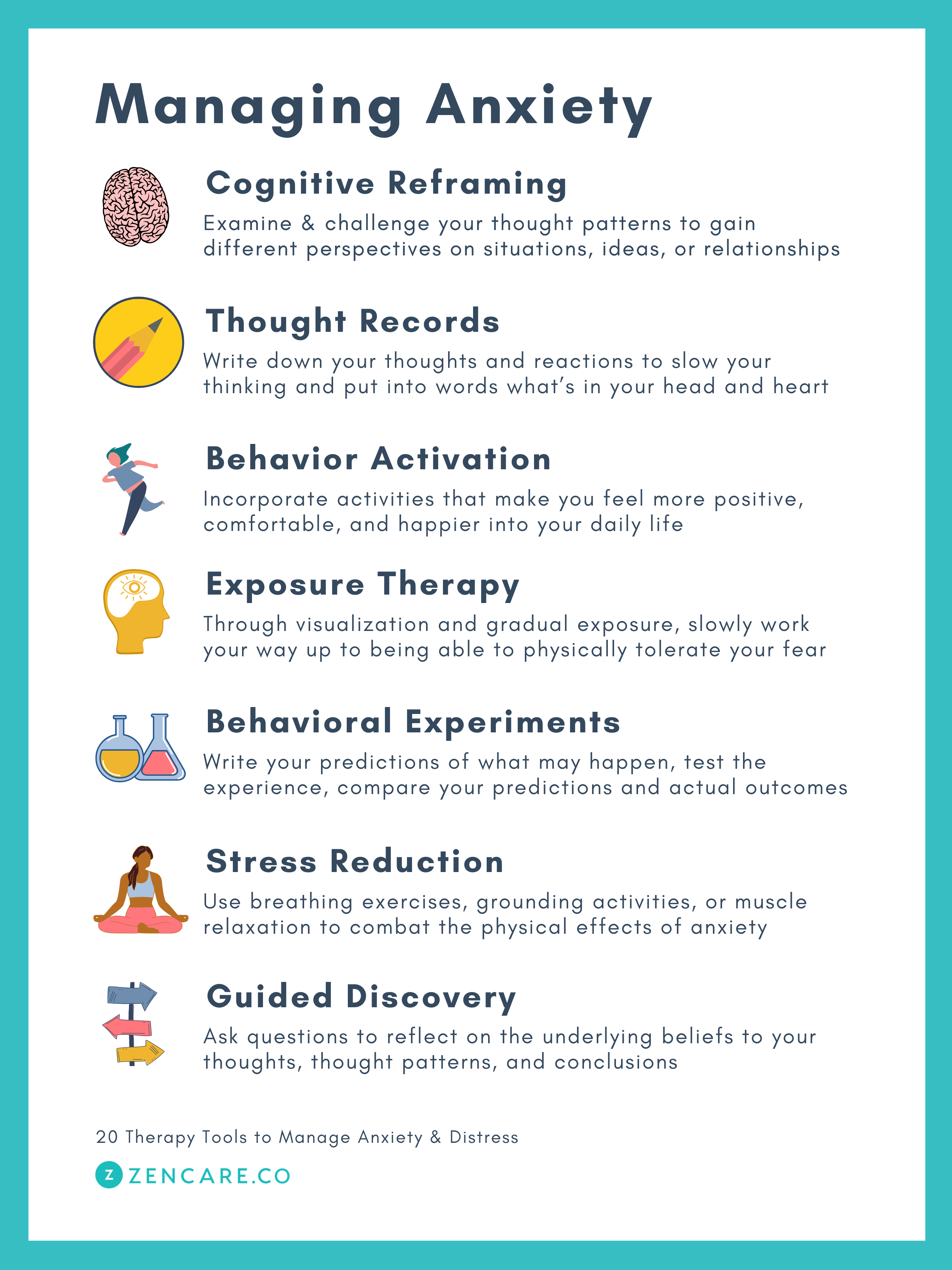Speak with a licensed therapist for anxiety and find peace of mind
Speak with a licensed therapist for anxiety and find peace of mind
Blog Article
Exploring Different Strategies in Therapy for Stress And Anxiety Disorder for Lasting Adjustment
When dealing with anxiety disorders, it's important to discover a selection of counseling strategies. Each technique offers special understandings and tools to aid you handle your signs effectively. You might discover that integrating methods can generate the most effective results. Nevertheless, recognizing the nuances of these methods is essential to promoting enduring modification. What if the best mix could release a brand-new degree of psychological health for you?
Understanding Anxiety Disorders: A Short Overview
Anxiety disorders, which influence numerous individuals worldwide, can significantly influence life. You might experience overwhelming feelings of concern or stress that seem unmanageable. These feelings can cause physical signs and symptoms like an auto racing heart, sweating, and even lightheadedness. Typical types of anxiousness conditions include generalized anxiety disorder, panic condition, and social anxiousness problem. Each has unique indications, yet they all share a propensity to disrupt your routine and relationships.Understanding the root triggers of your anxiousness is crucial. It could come from genes, mind chemistry, or life experiences. Acknowledging your triggers can aid you manage your actions much better. It's important to bear in mind that you're not the only one in this battle. Many individuals face comparable challenges, and seeking aid is a solid step towards feeling better. By discovering stress and anxiety disorders, you're already on the path to understanding and handling your condition better.
Cognitive-Behavioral Therapy: Testing Negative Thought Patterns

Determining Negative Idea Triggers
Acknowledging the details triggers behind your adverse thoughts can be crucial in handling stress and anxiety when you run into minutes of distress. Begin by focusing on situations that prompt feelings of worry or concern. Is it a congested space, a forthcoming due date, or a conversation with particular individuals? Write down these instances in a journal. This will aid you determine patterns in your reasoning. Notification physical sensations that accompany your adverse thoughts, like an auto racing heart or tightness in your chest. By identifying these triggers, you acquire understanding into what's sustaining your anxiousness. Recognizing these connections is the primary step in testing those thoughts and eventually gaining back control over your psychological reactions.

Changing Thoughts With Positives
Challenging negative thought patterns is an essential action in transforming your state of mind and lowering anxiousness. You might commonly locate yourself caught in cycles of self-doubt or catastrophic reasoning. As opposed to allowing these thoughts determine your sensations, technique changing them with positive affirmations or practical options. For instance, when you believe, "I can not manage this," change it to, "I can manage obstacles one action at once (Counseling services for anxiety)." This basic change can substantially influence your emotion. Consistently recognizing and countering these negative thoughts helps create a healthier inner discussion. Bear in mind, it takes time and initiative, but regularly exercising this technique can lead to enduring modification, equipping you to encounter stress and anxiety with restored self-confidence and resilience
Building Coping Techniques Together
Replacing adverse ideas is just the beginning of managing anxiousness properly. To develop enduring change, you need to build coping strategies that empower you. Cognitive-Behavioral Treatment (CBT) assists you determine and challenge those unhelpful idea patterns. With each other, you and your counselor can explore how these ideas effect your feelings and behaviors.Start by creating useful techniques, like journaling or mindfulness exercises, that allow you to challenge anxiousness head-on. When you face your fears progressively, you'll discover to respond differently.

Mindfulness and Acceptance-Based Approaches: Cultivating Present-Moment Awareness
As you navigate the complexities of anxiety, incorporating mindfulness and acceptance-based approaches can considerably boost your capacity to grow present-moment recognition. By concentrating on the present moment, you'll locate that you can observe your thoughts and feelings without judgment. This method aids you recognize your stress and anxiety without feeling overwhelmed by it.Engaging in mindfulness workouts, such as deep breathing, body scans, or guided reflections, permits you to ground yourself in your present experience. Acceptance-based techniques encourage you to welcome your emotions rather than deal with versus them. They lose their power over you.Incorporating these methods into your everyday regimen can change exactly how you respond to anxiousness when you accept your feelings. You'll develop resilience and discover to browse difficult situations with higher ease. Eventually, growing present-moment understanding lays the foundation for enduring modification, empowering you to lead a more fulfilling life.
Exposure Therapy: Confronting Fears Gradually
Direct exposure therapy assists you face your concerns in a gradual means, making it less frustrating. You'll find out techniques to encounter anxiety-provoking situations step by step, while likewise building coping techniques to manage your responses. This strategy encourages you to take site control and decrease anxiousness over time.
Progressive Direct Exposure Techniques
When facing anxiousness, slowly challenging your fears can be a powerful way to gain back control. This strategy, called progressive exposure, includes slowly exposing on your own to the scenarios or things that cause your anxiousness. Begin with less challenging scenarios and progressively work your method as much as even more difficult ones. If you're afraid of public speaking, you could start by speaking in front of a mirror, after that progress to sharing thoughts with a good friend, and ultimately deal with a little group. Each step helps desensitize you to the worry, developing your confidence in time. Keep in mind, it's important to rate yourself and commemorate little victories as you move with this process, strengthening your ability to manage stress and anxiety effectively.
Building Coping Approaches
Structure reliable coping approaches is important for taking care of anxiousness, especially as you challenge your worries progressively. One effective method is direct exposure treatment, where you start by encountering your worries in a controlled fashion. Start with much less intimidating situations and gradually see here now work your way up to more tough scenarios. This progressive exposure assists desensitize you to anxiousness sets off, making them less overwhelming.Incorporate relaxation techniques, such as deep breathing or mindfulness, to soothe your mind throughout exposure. Track your progress, celebrating tiny victories along the method to boost your self-confidence. Keep in mind, it's all right to take your time; the objective isn't excellence however constant improvement. By building these strategies, you'll encourage yourself to browse anxiety and embrace life much more totally.
Psychodynamic Therapy: Discovering Origin of Anxiousness
Psychodynamic therapy explores the unconscious mind, exposing the origin creates of your stress and anxiety - Counseling services for anxiety. By examining your ideas, feelings, and past experiences, this method assists you discover underlying problems and unresolved concerns that might contribute to your existing anxiousness. You'll function with a therapist to explore youth experiences, connections, and emotional patterns that form your reactions today.As you obtain understanding into these much deeper layers of your subconscious, you'll begin to acknowledge just how previous events influence your present behavior. This understanding can bring about catharsis, enabling you to refine emotions you may have suppressed.Through the restorative relationship, you can additionally determine defense devices that might have created in time, offering a more clear path to alter. Ultimately, psychodynamic therapy outfits you with the tools to resolve your anxiety at its core, advertising long lasting change in your psychological click here to find out more health
Integrative and Alternative Techniques: Combining Strategies for Greater Effectiveness
Integrating numerous healing strategies can improve your journey towards managing anxiousness more successfully. By integrating components from cognitive-behavioral therapy, mindfulness methods, and all natural methods, you can develop a tailored technique that addresses your special requirements. You might utilize cognitive-behavioral strategies to test negative idea patterns while incorporating mindfulness workouts to ground on your own in the present moment.Additionally, checking out holistic methods such as yoga or meditation can advertise leisure and reduce anxiousness signs. This mix enables you to establish higher self-awareness and resilience.Experimenting with these varied techniques can assist you find what resonates most with you. Bear in mind, it has to do with locating a harmony that works, instead of adhering to a single approach. This integrative strategy not just offers instant relief yet likewise promotes long-term abilities for managing anxiety, empowering you to reclaim control over your life.
The Duty of Support Equipments: Structure Durability Via Connection
While it may seem that taking care of stress and anxiety is a singular trip, having a strong support system can play a necessary duty in your durability. Bordering on your own with compassionate buddies, family, or support teams develops a secure room where you can openly share your sensations and experiences. You advise yourself that you're not alone in this struggle.These connections use encouragement and can give functional coping techniques that have actually worked for others when you link with others. It's also a possibility to get viewpoint; pals can aid you see circumstances differently, reducing feelings of isolation.Moreover, psychological support cultivates a feeling of belonging, which can greatly relieve anxiousness signs and symptoms. By leaning on your assistance system, you can build resilience and deal with difficulties better. Bear in mind, connecting for aid suggests strength, and it can make all the distinction in your journey towards handling stress and anxiety.
Regularly Asked Questions
What Are the Common Signs And Symptoms of Anxiousness Conditions?
You may experience restlessness, fatigue, difficulty concentrating, irritation, muscle mass tension, and rest disturbances. Physical symptoms can include rapid heart beat, sweating, and shivering. Identifying these signs early can help you look for proper support and treatment.

How Much Time Does Therapy Usually Last for Stress And Anxiety Conditions?
Treatment for anxiety problems usually lasts anywhere from a few weeks to several months. It actually depends upon your individual requirements, development, and the techniques your therapist uses to assist you handle your anxiety efficiently.
Can Medicine Be Utilized Together With Treatment for Anxiousness?
Yes, drug can absolutely be utilized alongside treatment for anxiety. Integrating both methods typically boosts treatment performance, helping you handle signs while exploring underlying problems through therapy. Always consult your doctor for tailored suggestions.
Are There Self-Help Techniques for Handling Anxiousness?
Yes, there are numerous self-help techniques for managing anxiousness. You can practice mindfulness, involve in normal exercise, preserve a balanced diet, develop a routine, and make use of deep breathing strategies to help in reducing stress and anxiety signs and symptoms effectively.
Exactly how Do I Know if I Need Expert Assistance for Stress And Anxiety?
You ought to consider looking for specialist aid for anxiety if it disrupts every day life, causes considerable distress, or if self-help methods aren't working. Trust your impulses; getting to out can result in far better coping abilities and assistance. Typical kinds of anxiousness problems include generalised anxiety problem, panic problem, and social stress and anxiety problem. When you encounter moments of distress, identifying the details triggers behind your unfavorable thoughts can be vital in taking care of anxiety. Replacing unfavorable thoughts is just the beginning of taking care of anxiousness efficiently. By analyzing your thoughts, feelings, and previous experiences, this technique assists you discover underlying problems and unsettled issues that might add to your present stress and anxiety. It's additionally a chance to acquire viewpoint; pals can assist you see scenarios differently, reducing sensations of isolation (Counseling services for anxiety).Moreover, psychological assistance fosters a sense of belonging, which can greatly alleviate anxiety signs
Report this page